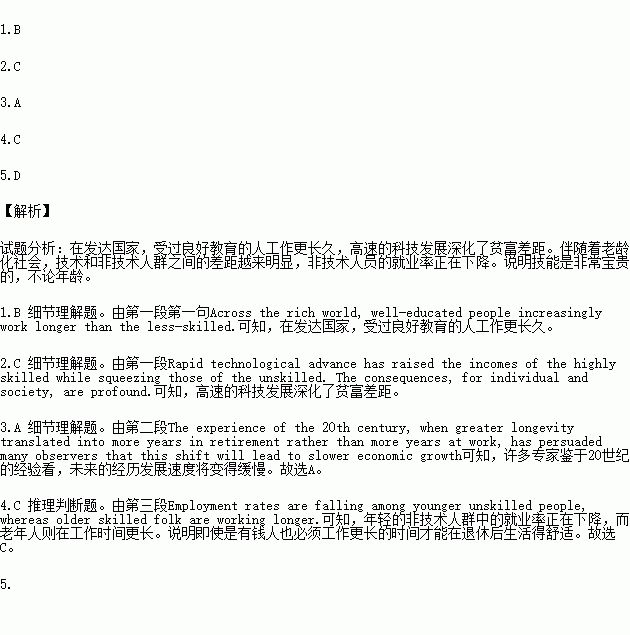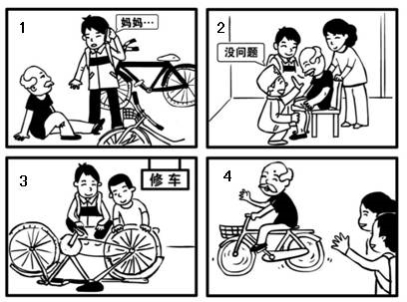题目内容
Across the rich world, well-educated people increasingly work longer than the less-skilled. Some 65% of American men aged 62-74 with a professional degree are in the workforce, compared with 32% of men with only a high-school certificate. This gap is part of a deepening divide between the well-education well off and the unskilled poor. Rapid technological advance has raised the incomes of the highly skilled while squeezing those of the unskilled. The consequences, for individual and society, are profound.
The world is facing as astonishing rise in the number of old people, and they will live longer than ever before. Over the next 20 years the global population of those aged 65 or more will almost double, from 600 million to 1.1 billion. The experience of the 20th century, when greater longevity translated into more years in retirement rather than more years at work, has persuaded many observers that this shift will lead to slower economic growth, while the swelling ranks of pensioners will create government budget problems.
But the notion of a sharp division between the working young and the idle old misses a new trend, the growing gap between the skilled and the unskilled. Employment rates are falling among younger unskilled people, whereas older skilled folk are working longer. The divide is most extreme in America, where well-educated baby-boomers (二战后生育高峰期出生的美国人) are putting off retirement while many less-skilled younger people have dropped out of the workforce.
That even the better-off must work longer to have a comfortable retirement. But the changing nature of work also plays a big role. Pay has risen sharply for the highly educated, and those people continue to reap rich rewards into old age because these days the educated elderly are more productive than the preceding generation. Technological change may well reinforce that shift: the skills that complement computers, from management knowhow to creativity. Do not necessarily decline with age.
1.what is happening in the workforce in rich countries?
A. younger people are replacing the elderly
B. well-educated people tend to work longer
C. unemployment rates are rising year after year
D. people with no college degree do not easily find work
2.what has helped deepen the divide between the well-off and poor?
A. Longer life expectancies
B. Profound changes in the workforce
C. rapid technological advance.
D. A growing number of well-graduated.
3.what do many observers predict in view of the experience of the 20th century?
A. Economic growth will slow down.
B. Government budgets will increase.
C. More people will try to pursue higher education
D. There will be more competition in the job market.
4.What is the result of policy changes in European countries?
A. Unskilled workers may choose to retire early.
B. more people have to receive in-service training.
C. Even wealthy people must work longer to live comfortably in retirement.
D. People may be able to enjoy generous defined-benefits from pension plans.
5.What is characteristic of work in the 21st century?
A. Computers will do more complicated work.
B. More will be taken by the educated young.
C. Most jobs to be done will be creative ones.
D. Skills are highly valued regardless of age.
 中考解读考点精练系列答案
中考解读考点精练系列答案短文改错
下面短文中有10 处语言错误。请在有错误的地方增加、删除或修改某个的单词。
增加:在缺词处加一个漏字符号(∧),并在其下面写上该加的词。
删除:把多余的词用斜线(﹨)划掉。
修改:在错的词下划一横线,并在该词下面写上修改后的词。
注意:1.每处错误及其修改均仅限一词;
2.只允许修改10 处,多者(从第11 处起)不计分。
例如:
It was very to get your invitation to spend ^ weekend with you. Luckily I was the am completely free then, so I’ll to say ”yes”. I’ll arrive in Bristol at around 8:00 p.m. in Friday on evening. |
An old man whose eyesight was failing comes to stay in a hotel, a bottle of whisky in his hand. On the wall was a fly he took for a nail.The moment he tried to hang the bottle on it, they fell and broke.When the landlady discovered what had been happened, she decided to do him favor.The next morning when he was out, the hotel worker hammered a nail exact where the “fly” had been.Before the old man came back, the smell of the whisky reminded him the accident.Looking at the spot what he thought the “fly” was again, he was so angry that he slapped it with all his strengths.On hearing the loud cry, the landlady rushed in.To her surprise, the poor old man was sitting on the floor with the palm of his hand bleed.
Apple picking | |
Apple picking is always a popular fall activity, with families looking for a fun way to spend time together outdoors. Check out some options on where and how to pick close to Toronto: | |
Where to pick | Pine Farms Tel: 905-833-5459 Hours: Tuesday to Sunday 9 am to 5 pm Details: Pick your own apples from mid-August to November. |
Albion Farms Tel: 905-584-0354 Hours: Daily 10 am to 6 pm Details: Pick your own apples on weekends only | |
Watson Farms Tel: 905-623-9109 Hours: Monday to Friday 9 am to 8 pm Weekends 9 am to 6 pm Details: Pick your own apples only in early September. | |
Brooks Farms Tel: 905-473-3920 Hours: Daily 9 am to 5 pm Details: Picking your own apples is not available(可得到的),but apples are available in the farm market. | |
Willis Family Fruit Farms Tel: 905-876-2606 Hours: Weekends 10 am to 8 pm Details: Pick your own apples only in September and October. | |
Apple picking tips | Call first: Certain apple types may not be available because demand and farm hours can change without notice. So call ahead before setting out. |
What to bring: Some farms provide containers(容器) for you to carry the fruit home, but it’s not a bad idea to bring them yourself. Comfortable shoes and clothes that you don’t mind getting dirty are a must. And keep the weather in mind: pack a sweater for cooler days, and bring sun cream. | |
1.According to the author, apple picking ______ .
A. helps farmers harvest the fruit
B. can bring great pleasure to families
C. is better for teenagers than for adults
D. is becoming more and more popular in cities
2.If you are only free after 6 pm on Tuesday, you can choose _____ .
A. Pine Farms B. Albion Farms
C. Watson Farms D. Willis Family Fruit Farms
3.What can we learn from the passage?
A. You may dirty your clothes when picking apples.
B. Apples on all the farms are on sale at the same time.
C. You have to pay to take the apples you have picked home.
D. You are not allowed to take containers for carrying apples.


